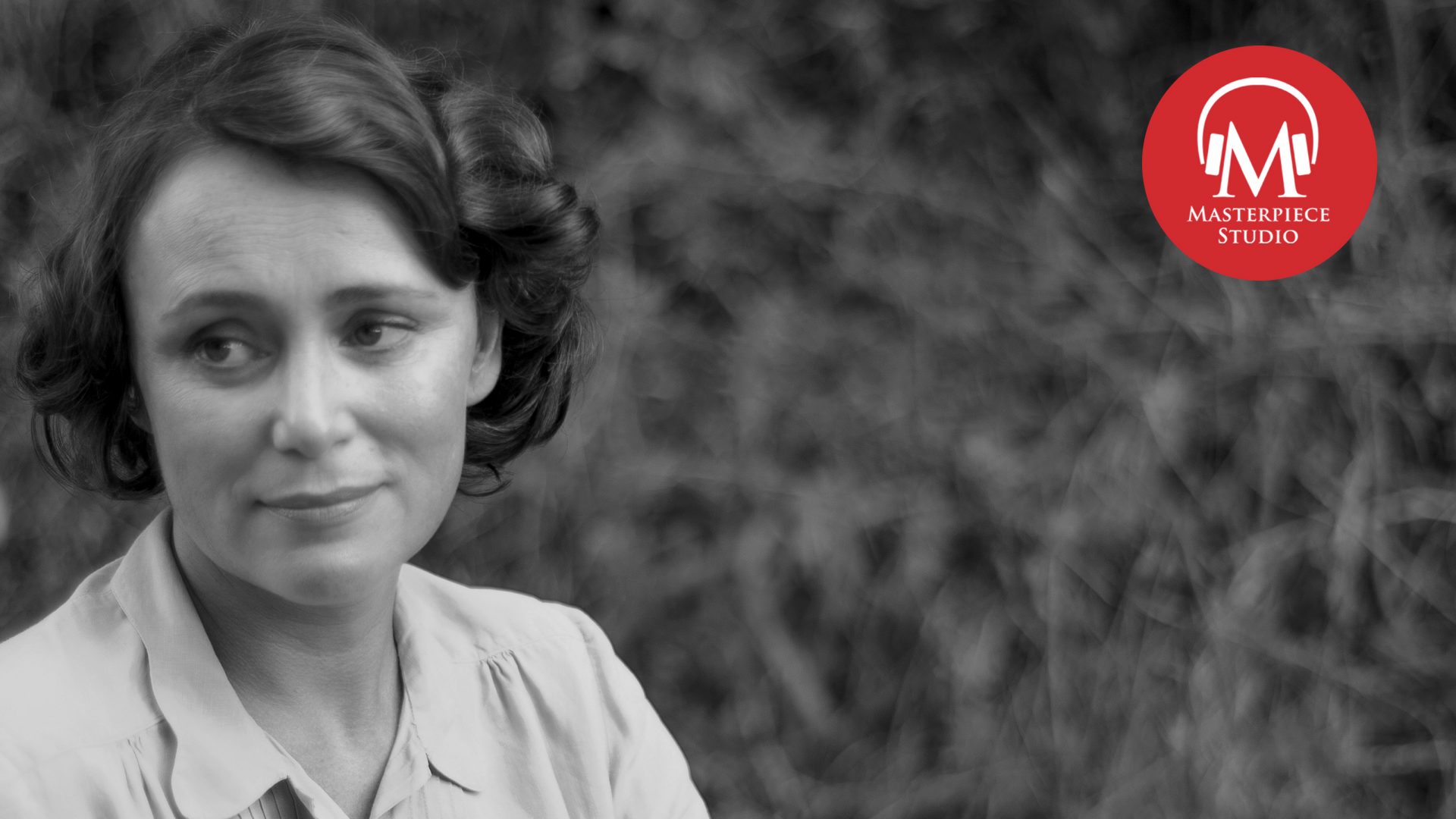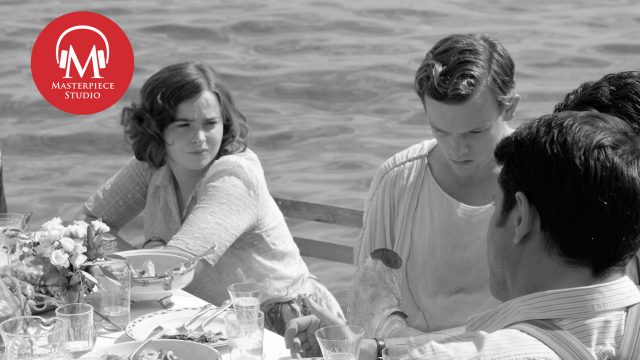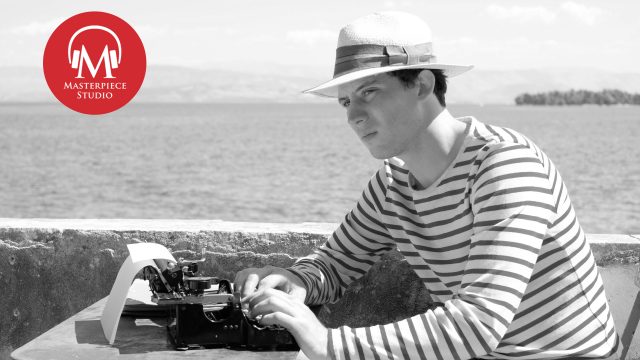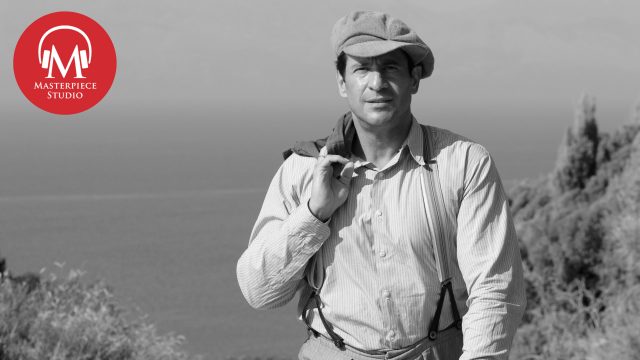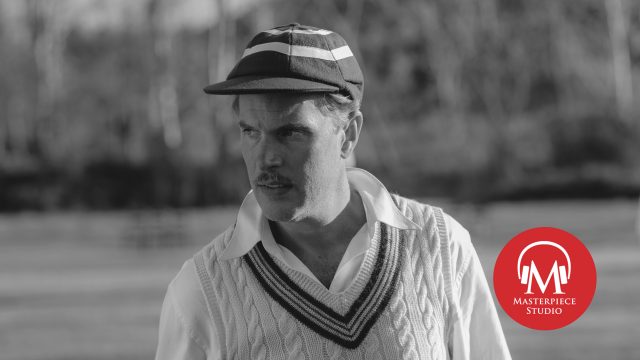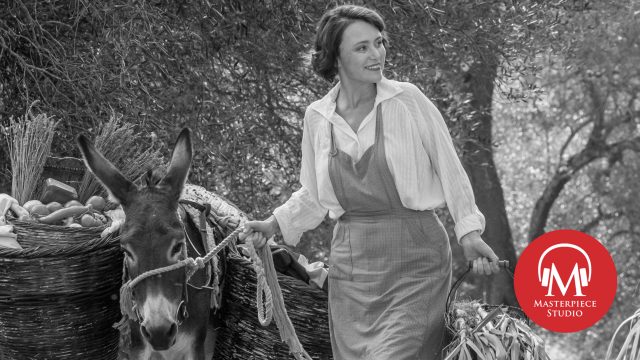Jace Lacob: I’m Jace Lacob, and you’re listening to a special bonus episode of MASTERPIECE Studio. After a busy few months on Corfu — the birth of two babies, the nascent revival of the Corfiot otter population and even an attempted murder — Louisa Durrell has decided to let another man go — and this time, he’s heading home to England.
CLIP
Hugh: You can’t say no.
Louisa: Do you realize what you’re asking me to do? Abandon the place that my family and I have come to love?
Jace: Though she tried her best to make the sputtering relationship with Hugh work, Louisa ultimately realizes her heart — and her home — is still with her family on Corfu.
CLIP
Keeley Hawes: You know as she says there’s just something that’s missing.
Jace: We spoke with actor Keeley Hawes about the Durrells’ zany second season antics, and about how her roles in the series Spooks and Line Of Duty changed her career — and her life.
Jace: This episode seems to have it all. Birth, death, lust and even attempted murder. Is this just another day in Corfu?
Keeley: It is I’m afraid. Yes, yes it is. It’s a it’s a really action packed episode, that one. We have as you say there are deaths, christening and an attempted murder.
Jace: Yes.
Keeley: There are. Yeah. I mean it is just about everything packed into to the finale. Yeah. And that was one of my favorite episodes.
Jace: There are three perfect shots in this episode. Louisa staring out at the ocean alone, Louisa crying in Spiros’s arms in the car.
Keeley: Yes.
Jace: And finally Louisa telling her brood she loves them at the edge of the cliff. Do these three similar images all encapsulate Louisa’s state of mind in some way?
Keeley: I think they absolutely do, and certainly the scene at the end you know where we’re all walking away after the christening, where Louisa turns to them and says ‘I love you.’ And then she says she says something like — she apologizes in a very, very British way. I I found that very moving, partly because when I look at them, not only am I think deeply fond of them, you know and I do feel like, they’ve all got wonderful mothers and they they don’t need that aspect of that relationship from me, but you know, it’s inevitable that I, that I feel like that towards them and I spend a lot of time with them. But when I look at them and I think about the fact that they did exist, you know and this little family did exist, and they had a mother that loved them, above all else. I found that — oh, I’m finding it quite moving now. And I think it has that wonderful thing that Simon Nye, our lovely writer, does where you know, there’s a moment there that could be quite saccharine and and actually he just flips it and she apologizes for loving them. And there’s something very British and something very real about that.
Jace: My favorite moment in this episode is the scene where Louisa encounters the Rose Beetle Man. A moment…
Keeley: Yes.
Jace: That really captures the beauty and magic of Corfu, an occurrence that Louisa later tells Hugh couldn’t happen in the Home Counties. What does this moment represent for Louisa?
Keeley: I think it represents freedom. It just references represents everything that she has come to love about Corfu, and the reason that she has made this journey and turned their lives upside down and you know she she wants to make it work, and she knows that she can make it work. And that scene — that scene’s very special to me and I think anybody who has read Gerald’s books and loves them will know exactly who that character is, and it doesn’t matter even if you haven’t read the books. It’s a beautiful moment that tells you a lot about her, and about the place and about where she is at that at that point. We spent a morning on that, and you know, every department seemed to really enjoy it. And it was just a wonderful thing to be part of. And so Durrells, it’s a really magical Durrells moment.
Jace: It is the epitome of a magical Durrells moment, in fact.
Keeley: It’s really is, yeah.
Jace: Louisa turns down she was offered to return to England. Hugh gets stabbed by Vasilia. Do these two things change her notion of love and what love means?
Keeley: I don’t think they do change her notion of love. I think she’s just more sure that that’s not the sort of love that she would settle for. She loved Sven and that was not to be. And you know, as we go into the second series, her heart still, you know, hurting from that. And so she probably wasn’t really ready to go into a relationship and settle down with somebody else. And it just so happens that Hugh actually wasn’t that person, anyway. And as as she says to to him, ‘Me and my children, we come in a bunch,’ and so also that relationship probably wouldn’t have worked out for her and the children, and ultimately that’s what’s important to her.
Jace: We touched on this briefly. There’s that beautiful scene of Louisa crying in Spiros’s arms in the car. Is this the moment where we do you feel she loves him but they cannot be together under any circumstances?
Keeley: Yes. I mean I think she’s had a hell of a day, with delivering Florence’s baby. And then the attempted murder of of Hugh. And you know she sits with Spiro and it all comes out. But he’s her you know he’s her best friend. And he’s the one that she can you know collapse in front of she she can she can let her guard down completely and in a way that. She probably wouldn’t have done with the children because it would be upsetting. But she can with him because he is her very best friend. So yes, it’s very moving.
Jace: Louisa begins the season by saying that things are going to change and they do. Babies are born, relationships falter and grow. Animals are saved. Is that ultimately the nature of the show — that life is ever changing, so live in the moment?
Keeley: Yes, I think it is, and certainly that last episode, everything changes, you know from the beginning in the hour to the end of it. Everything is changed again. But I think that the Durrells are very good at change. And certainly Louisa is very welcoming of it. And it sort of then sets us up for a fresh start in series three, you know, for some for some new adventures.
Jace: MASTERPIECE Studio is brought to you by by Farmers Insurance and their eighty-eight years of experience helping people so that they can prepare for the unexpected. They know a thing or two because they’ve seen a thing or two. Find an experienced agent at farmers.com
MASTERPIECE Studio is is also brought to you by Viking Curises. See the world differently by exploring differently. Learn more at vrc.com.
Jace: You were 26 when you were cast as Zoe in Spooks, which aired over here as MI5. What did that experience mean to you aside from meeting your future husband in co-star Matthew McFayden?
Keeley: It was wonderful. It was really sort of quite a life changing, life changing in many different ways. But it was it was sort of an unexpected hit really. And the main cast, the three of us, me and my now husband, Matthew McFadden, and David Oyelowo. We sort of between us were relatively unknown by anybody. And it became a hit show here and it opened lots of doors for us and we all became firm friends, we still are now.
Jace: You took over from John Sims’ Sam Tyler in Life on Mars to play D.I. Alex Drake in one of my all-time favorite series, Ashes to Ashes.
Keeley: Aw, thank you.
Keeley: What was the experience like and what was it like dealing with fan reaction?
Keeley: It was a very cold experience. It was very cold. I remember that we shot in the winter in the East End of London for three years. So when I think about that job, I just think mainly of being cold. But I again got on, the cast were absolutely lovely. And again we’re all still very friendly Phillip Glenister’s just wonderful and Dean Andrews and Monserrat Lombard, they just — it was a lovely thing to be part of. And the show changed quite dramatically from Life on Mars you know to Ashes, the era changed. So yeah it was it was quite odd. People weren’t sure what to what to make of it at first, but then it, you know, it was very successful.
Jace: And it culminated in my favorite finale of all time which made me sob endlessly. What was it like filming such a pivotal episode that managed to tie up five seasons of storylines while being so emotionally resonate?
Keeley: We were all in tears for days. It was so sad. It was so, so sad. And we wrapped the entire show — Philip Glenister and I share a birthday. And we were shooting our last scenes in a crematorium on our birthday, which was just all very odd. The show was very surreal, anyway, and we ended up drinking champagne in this crematorium with a big pink birthday cake and a big blue one, and all sort of looking at each other, and crying. So it was a fairly fitting end to to that show, but it was a lovely experience.
Jace: That is little amazing. Between The Durrells, Line of Duty, Spooks, Ashes to Ashes and a truly insane IMDB résumé, what role do you get recognized the most for these days?
Keeley: It depends, really. What’s on TV at the time is usually what I’m recognised for. But I do get called Mrs Durrell a lot, which is very sweet. And obviously we are watched by lots of families and children, and so quite often children, you know, are quite surprised to see Mrs. Durrell. I’m quite pleased, happy to say.
Jace: I’d be remiss if I didn’t ask about how difficult it was to play Line of Duty‘s — we’ll call her unbalanced copper, Lindsay Denton.
Keeley: You’re very kind.
Jace: The focus for the second season of the show, who spoiler alert, returned rather unexpectedly in season three. What was it like playing such a quicksilver character?
Keeley: It was just fantastic. I was very flattered to be asked to go back for a third series because you know the concept of the show is that each season, somebody else is investigated, so it is a surprise to me to be invited back. But it was wonderful, I mean, that that sort of writing, Jed Mercurio’s writing is so special and those sorts of scenes — I think at one point we had a 35-page scene, which in television is just unheard of. It’s probably quite a good thing. But they just work, and it’s a bit like doing a play, you know, sometimes the takes are 45-minutes long, and it takes such a huge amount of concentration from everybody involved, you know you wouldn’t want to be the boom operator, for example. You know, everyone it really has to give it their all. And so there’s an enormous sense of achievement that really comes from from doing something like that. And certainly a show like that and a character like that who then sort of seemed to capture people’s imaginations in a way that you can never predict. So yeah it was a fantastic thing to be part of.
Jace: How did playing Lindsay change your career going forward?
Keeley: Well it did change my career, really. It changed the way people saw me I think in just in that…I think playing somebody as sort of — there’s nothing glamorous about Lindsay Denton. And I think if you can show that you’re prepared to go to those lengths, then it can be quite eye-opening for people. And she she just went to some very very dark places. And so that’s that’s probably what did that.
Jace: Keeley Hawes, thank you so much.
Keeley: No problem at all. It was an absolute pleasure.
Jace: And that’s a wrap on 2017 for us here on MASTERPIECE Studio, but you can tune in at the beginning of 2018 for interviews with the cast and creative talent behind Victoria, set to premiere on MASTERPIECE January 14, 2018.
While you wait for Victoria season two, be sure and catch up on our interviews with the cast from season one. The episodes — with Jenna Coleman, Tom Hughes, Rufus Sewell and Daisy Goodwin — are all available on Apple Podcasts, Stitcher, or wherever else you listen to podcasts.
MASTERPIECE Studio is hosted by me, Jace Lacob and produced by Nick Andersen. Elisheba Ittoop is our editor. Special thanks to Barrett Brountas. Susanne Simpson is our executive producer. The executive producer of MASTERPIECE is Rebecca Eaton.
Sponsors for MASTERPIECE on PBS are Viking Cruises, Farmers Insurance, and The MASTERPIECE Trust.








